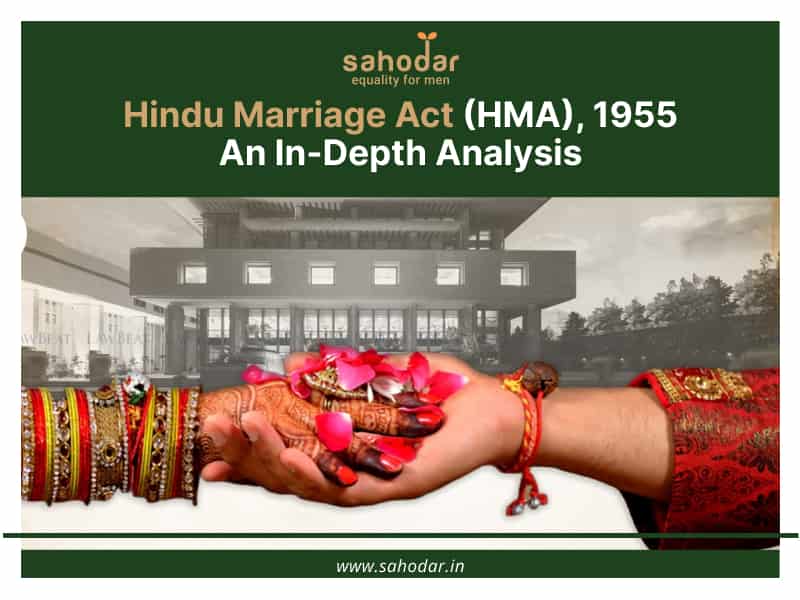The Hindu Marriage Act of 1955 is a cornerstone of Indian family law governing marriage, divorce, alimony, and remarriage among Hindus. Enacted on May 18, 1955, the Act was a significant move towards modernising and codifying traditional customs associated with Hindu marriages. It offers a legal framework that protects individuals’ rights within matrimonial relationships.
The Act lays down solemnisation, registration, divorce, maintenance, and remarriage provisions, addressing personal and societal issues in Hindu marriages.
Introduction
The Hindu Marriage Act of 1955 forms part of a broader legal effort to unify India’s diverse family laws while respecting religious customs. The Act applies to not only Hindus but also Buddhists, Jains, and Sikhs, ensuring that the religious customs of these communities are recognised within a legal structure. Key aspects of this law include conditions and ceremonies for a valid marriage, provisions for divorce, maintenance (alimony), and remarriage post-divorce. It also prevents harmful practices like bigamy, which was more prevalent before the Act’s implementation.
Applicability
The Hindu Marriage Act extends its scope beyond Hindus to include Buddhists, Jains, and Sikhs, as well as those who convert to any of these religions. Additionally, it applies to individuals domiciled in India who are not governed by other personal laws, such as Muslims, Christians, Parsis, or Jews. The Act also has international relevance, as it applies to Hindus residing abroad who are domiciled in India, ensuring that they remain subject to Hindu personal law.
Initially, the Act did not apply to citizens in Jammu and Kashmir, but this changed with the enactment of the J&K Hindu Marriage Act, 1955, extending the law’s applicability to that region.
Conditions for Marriage in Hindu Marriage Act
The Act lays down specific conditions that must be met for a marriage to be valid under Hindu law:
- Bigamy: Marrying while having a living spouse is prohibited under the Act, which mandates monogamy.
- Prohibited Degrees of Relationship: Marriages within prohibited degrees of kinship, such as between siblings or other close blood relations, are considered void. These restrictions are in place to prevent marriages with genetic or societal consequences, though some customs may allow exceptions.
- Sapinda Relationship: Marriages within the Sapinda relationship (descendants from a common ancestor) are void unless allowed by custom, with this rule intended to maintain familial integrity.
In addition to void marriages, the Act also defines conditions under which marriages are voidable, such as:
- Inability to Consummate: If one party is permanently and incurably incapable of consummating the marriage, it may be annulled.
- Fraud or Force: Marriages where consent was obtained by deception or force can be annulled.
- Pregnancy by Another Person: A marriage may be annulled if, at the time of marriage, the wife was pregnant by another man and the husband was unaware of this fact.
Ceremonies for Marriage
The Act respects the diversity of Hindu customs and does not mandate a specific ceremony to solemnise marriage. Marriages can be conducted following the rituals recognised by the couple’s community, such as Saptapadi (seven steps around the sacred fire) or other traditions.
While the Hindu Marriage Act does not make marriage registration mandatory, many states in India require couples to register their marriage. Registration serves as legal proof of marriage, simplifying legal proceedings related to inheritance, legitimacy of children, and divorce. To register, couples must apply with the marriage registrar, providing documents such as proof of the marriage ceremony and identity documents. The presence of witnesses is necessary for validation.
A registered marriage certificate helps prevent disputes and is often required for official procedures, such as obtaining passports or visas or settling legal matters.
Divorce under the Hindu Marriage Act
The Hindu Marriage Act offers provisions for both mutual consent divorce and contested divorce.
- Mutual Consent Divorce: Under Section 13-B, couples may seek a divorce if they have been living separately for at least one year and mutually agree that their marriage has broken beyond repair.
- Contested Divorce: If one spouse does not agree to a divorce, the other may file for divorce on specific grounds provided by the Act.
Grounds for Divorce
The Act specifies various grounds for divorce, including:
- Adultery: When one spouse engages in voluntary sexual relations with another person.
- Cruelty: Physical or mental cruelty that makes cohabitation unbearable.
- Desertion: Continuous abandonment of one spouse for at least two years.
- Conversion: If one spouse converts to another religion.
- Mental Disorder: A spouse’s mental illness makes cohabitation impossible.
- Incurable Diseases: Serious illnesses such as leprosy or venereal diseases.
- Renunciation of the World: When a spouse renounces worldly life.
- Presumption of Death: If a spouse has been missing for seven years or more.
These provisions ensure that individuals can dissolve their marriage if the relationship becomes unsustainable.
Alimony (Permanent Maintenance)
The Act provides for alimony or maintenance to the financially weaker spouse. Courts consider various factors such as the income, property, and standard of living of both spouses when awarding maintenance. Payments can be either a lump sum or periodic, ensuring financial support after divorce.
Remarriage in Hindu Marriage Act
Under Section 15 of the Hindu Marriage Act, both parties are free to remarry once their divorce is finalised. This provision enables individuals to move on and rebuild their lives.
Conclusion
The Hindu Marriage Act of 1955 is a comprehensive legal framework that governs Hindu marriages, ensuring both traditional values and modern legal recourse are respected. By regulating marriage, divorce, alimony, and remarriage, the Act protects the rights of individuals within the institution of marriage while upholding fairness and justice.

